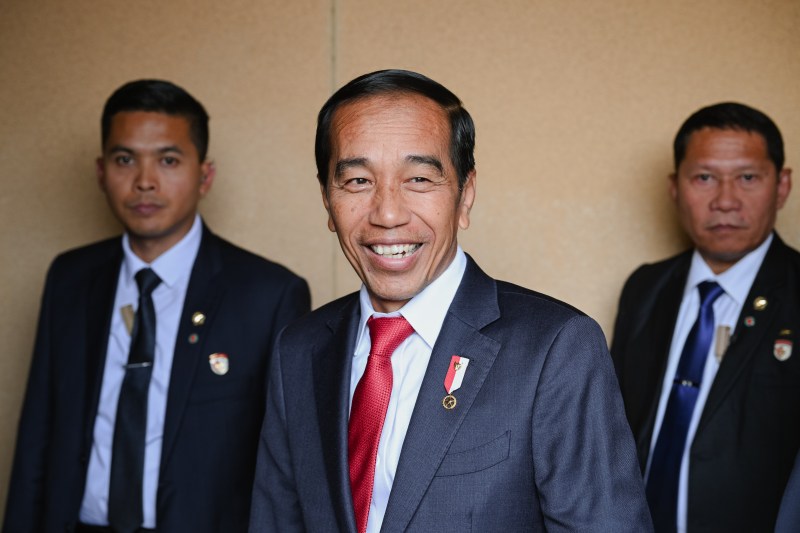“Do I look like a member of the Stanford family now?” Indonesian President Joko Widodo, commonly known as “Jokowi,” asked the audience at Schwab Residential Center as he showed off his red tie worn in the Stanford spirit. “Now you see how it is important to be connected to each other as people, and so too is the importance of being connected to nature.”
Jokowi spoke Wednesday on the collaboration between Stanford and Indonesia on sustainability, as part of the Doerr School of Sustainability’s Dean’s Lecture Series, a forum that brings leaders to discuss innovations in sustainability. He highlighted Indonesia’s recent environmental achievements and sustainable development for its new city, Nusantara, which will replace Jakarta as the country’s capital.
Jokowi’s visit to Stanford was part of his larger trip to the United States for the Asia-Pacific Economic Cooperation (APEC) Economic Leaders’ Week held in San Francisco this week. His speech at Stanford followed a meeting with President Joe Biden on Monday regarding various subjects in the U.S.-Indonesia Comprehensive Strategic Partnership including mineral mining, maritime security in the South China Sea and clean energy transitions.
Dean of the Doerr School Arun Majumdar expressed delight at Biden and Jokowi’s announcement of the comprehensive strategic partnership between the U.S. and Indonesia on Monday.
“In our small way, we at Stanford would like to bring that vision to reality,” Majumdar said, referencing Biden’s vision of a strong U.S.-Indonesia collaboration in a variety of fields, including sustainable urban development, climate financing and clean technology innovation.
Jim Leape, co-director of Stanford’s Center for Ocean Solutions and former director general of the World Wildlife Fund, said the president’s visit will bring visibility to Stanford-Indonesia projects such as climate finance, clean energy transitions, sustainable development of Nusantara and sustainable aquatic foods.
“There are very exciting research initiatives just getting underway with partners in Indonesia, and his visit provides a nice boost to those nascent efforts that we hope are the beginning of longer, broader collaborations. [It’s] fantastic to have the president here, as those begin to take off,” Leape said.
Indonesia, the third largest democracy in the world and fourth most populous country, faces a host of sustainability challenges as it balances its abundant natural resources, rapidly developing economy and sustainability goals, both as a nation and for its new capital city, Nusantara.
Jokowi called Nusantara a “smart city,” with 70% of it being “green zones.” A botanical center with the capacity to hold 15 million tree seedlings per year — three times as many trees as are currently planted in New York City — will be planted in Nusantara and on the island of Kalimantan, he said in an interview with the New York Times.
“It’s very rare that the world gets to design and build a city from scratch, and it could be a model for the rest of the world [on what] sustainable urban living is all about,” Majumdar said, highlighting the sustainable urban development opportunities of Nusantara.
Jokowi also invited Stanford students to go on a “study-tour” of Nusantara, encouraging students to learn from the sustainable development process in person.
“I’m a forestry graduate, so if needed, I can be your guide,” Jokowi said.
He spoke about Indonesia’s recent environmental accomplishments, including reducing emissions by 91.5 million tons, rehabilitating 77,000 hectares of forest area and restoring 34,000 hectares of mangrove forests in a year. He also raised Indonesia’s recent efforts in building the largest floating solar power plant in Southeast Asia, located in Indonesia’s Cirata reservoir.
Jokowi also talked about the large and equitable investments needed for “technology transfer and collaboration” in providing affordable energy for people in Indonesia and other developing countries in the energy transition.
Concluding the event, Majumdar and representatives from Indonesia publicly signed a joint statement agreeing to explore opportunities to work together on research and education projects in areas where there are linkages between Stanford scholarship and Indonesia’s sustainability goals, including projects such as low-carbon economic development, financing the transition to a more sustainable society, meeting pressing food priorities and building a new, sustainable capital city.
Linda Mulyani MBA ’24, an Indonesian student, said the public signing of the joint statement made her “feel like they are very serious about this.”
“I feel some sense of measured optimism,” Mulyani said. “As the President mentioned, [construction] is going to take another 15-20 years and there’s a presidential election coming up next year.”
Jokowi’s visit to Stanford and Indonesia’s sustainability endeavors are also contextualized by Indonesia’s upcoming presidential election, during which Jokowi will not be running for re-election.
“The issue of sustainability is on everybody’s mind on this planet. Whichever candidates are running are likely to take ownership with the issue of sustainability. With the extent that the new capital city is positioned [with] a narrative of sustainability, I think it’s inseparable from what’s important,” said Gita Wirjawan, the former Minister of Trade of Indonesia.
According to Wirjawan, this visit is “important in terms of symbolizing what’s critical for humanity and what’s critical for the world going forward.”
“We can no longer take an easy walk,” Jokowi said. “We must run fast. We must fear the tree.”
